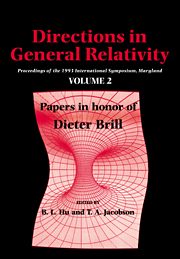 Directions in General Relativity
Directions in General Relativity Book contents
- Frontmatter
- Contents
- Contributors
- Symposium Program
- Papers from both Volumes Classified by Subjects
- Preface
- Dieter Brill: A Spacetime Perspective
- Thawing the Frozen Formalism: The Difference Between Observables and What We Observe
- Jacobi's Action and the Density of States
- Decoherence of Correlation Histories
- The Initial Value Problem in Light of Ashtekar's Variables
- Status Report on an Axiomatic Basis for Functional Integration
- Solution of the Coupled Einstein Constraints On Asymptotically Euclidean Manifolds
- Compact Cauchy Horizons and Cauchy Surfaces
- The Classical Electron
- Gauge (In)variance, Mass and Parity in D=3 Revisited
- Triality, Exceptional Lie Groups and Dirac Operators
- The Reduction of the State Vector and Limitations on Measurement in the Quantum Mechanics of Closed Systems
- Quantum Linearization Instabilities of de Sitter Spacetime
- What is the True Description of Charged Black Holes?
- Limits on the Adiabatic Index in Static Stellar Models
- On the Relativity of Rotation
- Recent Progress and Open Problems in Linearization Stability
- Brill Waves
- You Can't Get There from Here: Constraints on Topology Change
- Time, Measurement and Information Loss in Quantum Cosmology
- Impossible Measurements on Quantum Fields
- A New Condition Implying the Existence of a Constant Mean Curvature Foliation
- Maximal Slices in Stationary Spacetimes with Ergoregions
- (1 + 1)-Dimensional Methods for General Relativity
- Coalescence of Primal Gravity Waves to Make Cosmological Mass Without Matter
- Curriculum Vitae of Dieter Brill
- Ph. D. Theses supervised by Dieter Brill
- List of Publications by Dieter Brill
The Initial Value Problem in Light of Ashtekar's Variables
Published online by Cambridge University Press: 06 January 2010
- Frontmatter
- Contents
- Contributors
- Symposium Program
- Papers from both Volumes Classified by Subjects
- Preface
- Dieter Brill: A Spacetime Perspective
- Thawing the Frozen Formalism: The Difference Between Observables and What We Observe
- Jacobi's Action and the Density of States
- Decoherence of Correlation Histories
- The Initial Value Problem in Light of Ashtekar's Variables
- Status Report on an Axiomatic Basis for Functional Integration
- Solution of the Coupled Einstein Constraints On Asymptotically Euclidean Manifolds
- Compact Cauchy Horizons and Cauchy Surfaces
- The Classical Electron
- Gauge (In)variance, Mass and Parity in D=3 Revisited
- Triality, Exceptional Lie Groups and Dirac Operators
- The Reduction of the State Vector and Limitations on Measurement in the Quantum Mechanics of Closed Systems
- Quantum Linearization Instabilities of de Sitter Spacetime
- What is the True Description of Charged Black Holes?
- Limits on the Adiabatic Index in Static Stellar Models
- On the Relativity of Rotation
- Recent Progress and Open Problems in Linearization Stability
- Brill Waves
- You Can't Get There from Here: Constraints on Topology Change
- Time, Measurement and Information Loss in Quantum Cosmology
- Impossible Measurements on Quantum Fields
- A New Condition Implying the Existence of a Constant Mean Curvature Foliation
- Maximal Slices in Stationary Spacetimes with Ergoregions
- (1 + 1)-Dimensional Methods for General Relativity
- Coalescence of Primal Gravity Waves to Make Cosmological Mass Without Matter
- Curriculum Vitae of Dieter Brill
- Ph. D. Theses supervised by Dieter Brill
- List of Publications by Dieter Brill
Summary
Abstract
The form of the initial value constraints in Ashtekar's hamiltonian formulation of general relativity is recalled, and the problem of solving them is compared with that in the traditional metric variables. It is shown how the general solution of the four diffeomorphism constraints can be obtained algebraically provided the curvature is non-degenerate, and the form of the remaining (Gauss law) constraints is discussed. The method is extended to cover the case when matter is included, using an approach due to Thiemann. The application of the method to vacuum Bianchi models is given. The paper concludes with a brief discussion of alternative approaches to the initial value problem in the Ashtekar formulation.
Introduction
It is with great pleasure that we dedicate this paper to Dieter Brill, our teacher, advisor, and colleague, on the occasion of his 60th birthday. Our contribution concerns the initial value problem for general relativity, which is amongst Dieter's many areas of expertise. As is the case with almost all research activity developed around the general relativity group at the University of Maryland, the ideas we will present have benefitted from Dieter's always kind and sometimes maddening insightful questioning. Of course it is our wish that this paper will prompt some more such questioning.
- Type
- Chapter
- Information
- Directions in General RelativityProceedings of the 1993 International Symposium, Maryland: Papers in Honor of Dieter Brill, pp. 66 - 77Publisher: Cambridge University PressPrint publication year: 1956
- 2
- Cited by


